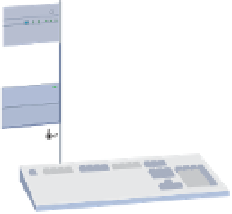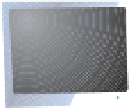Information Technology Reference
In-Depth Information
processing. The Ticketmaster reservation service is an example of a centralized system. One
central computer with a database stores information about all events and records the pur-
chases of seats. Ticket clerks at various ticket selling locations can enter order data and print
the results, or customers can place orders directly over the Internet.
With
decentralized processing
, processing devices are placed at various remote locations.
Each processing device is isolated and does not communicate with any other processing
device. Decentralized systems are suitable for companies that have independent operating
units, such as 7-Eleven, where each of its 5,800 U.S. stores is managed to meet local retail
conditions. Each store has a computer that runs over 50 business applications such as cash
decentralized processing
Processing alternative in which pro-
cessing devices are placed at vari-
ous remote locations.
register operations, gasoline pump monitoring, and merchandising.
With
distributed processing
, processing devices are placed at remote locations but are
connected to each other via a network. One benefit of distributed processing is that managers
can allocate data to the locations that can process it most efficiently. Kroger operates over
2,400 supermarkets, each with its own computer to support store operations such as customer
checkout and inventory management. These computers are connected to a network so that
sales data gathered by each store's computer can be sent to a huge data repository on a
mainframe computer for efficient analysis by marketing analysts and product supply chain
managers.
The September 11, 2001, terrorist attacks and the current relatively high level of natural
disasters such as Hurricane Katrina sparked many companies to distribute their workers,
operations, and systems much more widely, a reversal of the previous trend toward central-
ization. The goal is to minimize the consequences of a catastrophic event at one location
while ensuring uninterrupted systems availability.
distributed processing
Processing alternative in which
computers are placed at remote
locations but are connected to each
other via a network.
File Server Systems
Users can share data through file server computing, which allows authorized users to down-
load entire files from certain computers designated as file servers. After downloading data to
a local computer, a user can analyze, manipulate, format, and display data from the file (see
Figure 6.8).
File downloaded
to user
Figure 6.8
File Server Connection
The file server sends the user the
entire file that contains the data
requested. The user can then
analyze, manipulate, format, and
display the downloaded data with a
program that runs on the user's
personal computer.
File server
computer
Client/Server Systems
In
client/server
architecture, multiple computer platforms are dedicated to special functions
such as database management, printing, communications, and program execution. These
platforms are called
servers
. Each server is accessible by all computers on the network. Servers
can be computers of all sizes; they store both application programs and data files and are
equipped with operating system software to manage the activities of the network. The server
distributes programs and data to the other computers (clients) on the network as they request
them. An application server holds the programs and data files for a particular application,
such as an inventory database. The client or the server can do the processing.
A client is any computer (often a user's personal computer) that sends messages requesting
services from the servers on the network. A client can converse with many servers concur-
rently. For example, a user at a personal computer initiates a request to extract data that
resides in a database somewhere on the network. A data request server intercepts the request
and determines on which database server the data resides. The server then formats the user's
client/server
An architecture in which multiple
computer platforms are dedicated
to special functions such as
database management, printing,
communications, and program
execution.








































